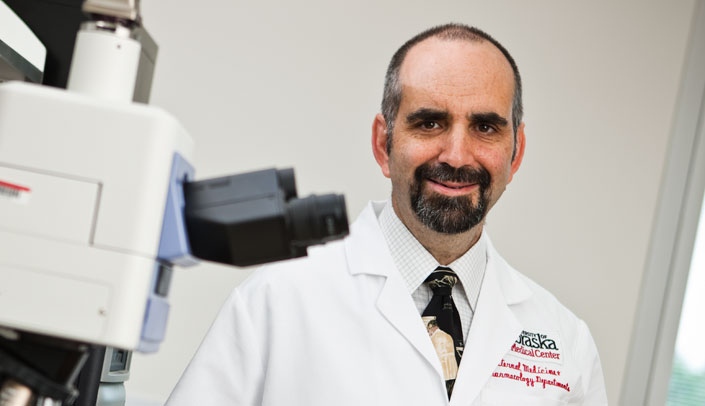UNMC College of Medicine faculty received 22 grant awards representing more than $3.4 million in new funding during the month of March.
Here’s a brief summary of five of the largest grants received:
Research on HIV and neurodegeneration continuously funded for more than 20 years
Howard Gendelman, MD, pharmacology & experimental neuroscience, has received a continuation of his National Institutes of Health award for more than $561,000 from the National Institute of Neurological Disorders and Stroke. This is a renewal of a grant that has been continuously funded since 1995. The award supports research into the effects that HIV infection has on the immune system and the central nervous system, such as virus-induced neuro-inflammation, and how this leads to the progression of neurodegenerative diseases such as Alzheimer’s or Parkinson’s disease.
Using MEG imaging to assess HIV-associated neurocognitive disorders
Tony Wilson, PhD, neurological sciences, has received a National Institutes of Health award for more than $522,000 from the National Institute of Mental Health for a neuroimaging study using magnetoencephalography to evaluate the role of novel neurophysiological parameters, also involved in aging, in the pathophysiology of patients with HIV-associated neurocognitive disorders.
Role of novel signaling pathway in pancreatic cancer
Rakesh Singh, PhD, pathology & microbiology, has received a National Institutes of Health award for more than $401,000 from the National Cancer Institute for a study that will explore the role and molecular mechanisms behind a novel CXCR2 cell-signaling pathway in the pathogenesis of pancreatic cancer. He also will assess the efficacy of using therapies that target this pathway in combination with conventional anti-tumor regimens in pancreatic cancer.
Developing a novel target for combinational colon cancer therapy
Punita Dhawan, PhD, biochemistry & molecular biology, has received a National Institutes of Health award for more than $165,000 from the National Cancer Institute to study the role of a novel therapeutic target involved in colon cancer progression. He will study the molecular mechanism and regulation of the therapeutic target and try to determine if it could serve as a target for combinational anti-colon cancer therapy.
Uncovering the mechanisms of photoreceptor neurotransmission
Justin Grassmeyer, an MD/PhD student in the department of pharmacology & experimental neuroscience, has received a National Institutes of Health, Ruth L. Kirschstein pre-doctoral National Research Service Award for more than $43,000 from the National Eye Institute to investigate the underlying molecular mechanisms of calcium-dependent photoreceptor neurotransmission in an animal model.
Industry-sponsored grants:
The following industry-sponsored contracts and foundation grants were received. Information on clinical trials enrolling patients at UNMC can be found here.
Krishna Gundabolu, MBBS, internal medicine – oncology/hematology, is the UNMC lead on a phase Ib clinical study of novel combination therapy for patients with primary myelofibrosis.
William Rizzo, MD, pediatrics – metabolism, is the UNMC lead on a phase III clinical trial of a topical dermal cream as a treatment for Sjögren-Larsson syndrome.
Diana Florescu, MD, internal medicine – infectious disease, is the UNMC lead on a phase III clinical trial to evaluate a new anti-viral drug for the prevention of human cytomegalovirus infection in adult allogenic hematopoietic stem cell transplant recipients.
Stephen Bonasera, MD, PhD, internal medicine – geriatrics, has received support from the University of California – San Francisco to assist with the development of a novel dementia care program that aims to support caregivers in addition to complementing primary care.
John Colombo, MD, pediatrics – pulmonology, has received a Therapeutics Development Center Award from the Cystic Fibrosis Foundation.
Angela Yetman, MD, pediatrics – cardiology, has received continued support from the Pediatric Heart Network to evaluate the clinical efficacy and safety of a novel, orally administered selective inhibitor for the treatment of adolescent subjects who have undergone the Fontan procedure.
Mark Carlson, MD, surgery – general surgery, has received funding from the Otis Glebe Medical Research Foundation, through the University of Nebraska Foundation, for the pre-clinical development of a synthetic absorbable hernia mesh in an animal model.
Sukhwinder Kaur, PhD, biochemistry & molecular biology, has received support to study a seromic mucin signature for the early diagnosis of pancreatic cancer.
Vijay Shivaswamy, MBBS, internal medicine – diabetes, endocrinology and metabolism, has received two separate awards to fund technical salary support for his clinical trials sponsored by the Veterans Affairs Nebraska Educational Biomedical Research Association.
Chi Zhang, MD, PhD, radiation oncology, received a pilot program grant through the Great Plains IDeA-CTR and the Eppley Cancer Center for a study titled "Targeting Androgen Receptors to Treat Glioblastoma (GBM), a Translational Research Using Primary Human GBM Cell Cultures and Animal Models, Addresses Glioblastoma."
Paul Esposito, MD, orthopaedic surgery, has received support from the Osteogenesis Imerfecta Foundation to lead UNMC's clinical site as part of the Brittle Bone Disorders Consortium.
Mark Kusek, MD, pediatrics – gastroenterology, has received continued support from the University of North Carolina at Chapel Hill to assist in a study evaluating the use of combination therapy in pediatric patients with Crohn’s disease.
Andre Kalil, MD, internal medicine – infectious diseases, has received support from Duke University through the Antibacterial Resistance Leadership Group to assist with the study of a next generation antibacterial treatment for lung infections. Dr. Kalil also has received support from the University of Southern California to assist with developing a rapid assessment of acute illness and injury to enhance the response to public health emergencies.
Adam Burdorf, DO, internal medicine – cardiology, is the UNMC lead on an observational study to characterize the hemodynamic-guided management of patients with an existing left ventricular assist device.
Carl Bryce, MD, family medicine, has received academic support from the Uniformed Services Academy of Family Physicians.
